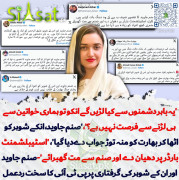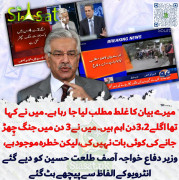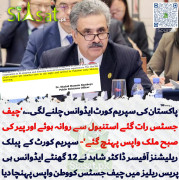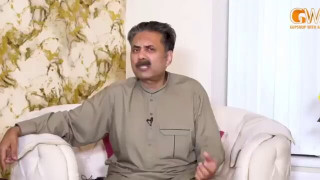You are using an out of date browser. It may not display this or other websites correctly.
You should upgrade or use an alternative browser.
You should upgrade or use an alternative browser.
Is it Sunnah,Wajib or Farz to keep Beard
- Thread starter KhanHaripur
- Start date
Raaz
(50k+ posts) بابائے فورم
Please describe the size because there're many different sizes of it?
پیٹ میں ہو تو سب سے اچھی ہے
Saboo
Prime Minister (20k+ posts)
Please describe the size because there're many different sizes of it?
It should be atleast this much that a ' tinka ' or two could be hidden in it.
Saboo
Prime Minister (20k+ posts)
Muslims were having exactly same kind of discussion and arguing with each other on similar issues when Halaku (Hulagu) Khan's forces were advancing towards Baghdad :banghead:
Looks like history is repeating itself.
Imran Khan's forces are knocking at the door!
Thanks for the nice topic and now its upto nulla whether tell it sunnah, farz or wajb where as in holy book its stated variously that beard was of feon. He was a king of ferhana today egypt. When it was in original was liked by god and when forged was disliked. Sunnah could be a term which is not stated in holy book. As huzoor may peace be upon been taking sweets after meal its sunnah. What ever is said by holy book had been adapted by holy and blessed prophets stands farz particularly holy book clear that the deeds of khalil allah god's friend r farz. Neither beard is farz nor obligatory it suits to kings and a leads of a tribe or head of a house and who ever but is not wajib. When its red in color is a visible sign of a sudkhors . . . . . . . . noran
In all schools of Islamic Law, it is considered wajib (mandatory) for a Muslim male to grow a beard. It is also wajib to let the beard grow a fist length. It is prohibited to cut or shave the beard. He who does so is a fasiq (sinner) and to shorten it less than a fist length is makrooh tahrimi (near haram). This is the view of the majority of scholars. (see Wujoob I'efaaul-lihyah of Shaykhul Hadith, Ml. Muhammad Zakariyyah and the footnotes of ex-grand Mufti of Saudia - Shaykh ibn Baaz). The opinions of the fours schools are as follows.
Hanafia: Allaamah ibnul Humaam (RA) has mentioned that nobody has permitted the trimming of the beard lesser than a fist length. (Fathul Qadeer; Shaami; Fataawa Mahmoodiyyah vol.5 pgs.93, 105, 108)
Shafi'eah: Allaamah Nawawi (RA) states, 'The correct view (according to the Shafi'ee Madhab) is to leave the beard to grow and it is makrooh to trim the beard whatsoever.' (al-Majmoo vol.1 pg.290; also see Sharh Saheeh Muslim vol.2 pg.143)
Allaamah al-Iraaqi (RA) states in his book entitled, 'Tarhu Tathreeb' (vol.2 pg.8): '. that the best is to leave the beard totally and not to cut anything from it at all, and this is the view of Imam al-Shafi'ee and his students.'
There are quotations from two great scholars of the Shaafi'ee Madhab that do not permit the trimming of the beard at all, not even beyond one fist.
Malikiah: Imam Abul-Waleed al-Baji al-Maliki (RA) states: It has been narrated from Imam Malik (RA) that he permitted the slight trimming of those hair that are overgrown and are outside the general growth of the rest of the hair, and that Imam Malik (RA) was asked about a beard that had grown extremely long, he replied that it should be trimmed a bit.'
Imaam Abul-Waalid adds, 'And it has been narrated from Abdullah ibn Umar and Abu Huraira (Radhiallaahu Anhum) that they trimmed beyond one fist.' Hence, this is what was meant by Imam Malik. (refer al-Muntaqa vol.7 pg.266)
Imaam al-Qurtubi al-Maaliki (RA) has also mentioned something similar to this in his commentary of Sahih Muslim. (see al-Mufhim vol.1 pg.513)
Hanbaliah: Imaam Samiri (RA) - who is an expert Hanbali faqih (jurist) - states:
And he should not trim any bit from the beard except if he wishes to do so beyond the extent of one fist. However, it will be best if he doesn't do so.' (al-Mustaw'ib vol.1 pg.260 - see Hukm al-Lihyah fil Madhaahibil arba'ah; Abdul-Aziz al-Nu'maani pg.50)
Another Hanbali scholar, Imam Shamsuddeen al-Maqdisi (RA) states, 'It is forbidden to shave the beard and it is not makrooh to trim what is in excess of a fist's length because this is supported by the practice of Sayyiduna Abdullah ibn Umar, Radi-Allahu anhu,.' (Kitaabul Furoo vol.1 pg.130; Ibid)
Similar verdicts are found in other sources of Hanbali Fiqh such as al-Mubdi of ibn Muflih, al-Insaaf of al-Maawardi; Kashful Qinaa, etc.(Hukm al-lihyah pg.50)
It is clear from all these quotations that it is permissible to trim the beard only beyond a fist length. No one has explicitly mentioned that it is permissible to trim the beard lesser than a fist length. In fact, according to some of these quotations, it will be better not to trim the beard at all.
Hanafia: Allaamah ibnul Humaam (RA) has mentioned that nobody has permitted the trimming of the beard lesser than a fist length. (Fathul Qadeer; Shaami; Fataawa Mahmoodiyyah vol.5 pgs.93, 105, 108)
Shafi'eah: Allaamah Nawawi (RA) states, 'The correct view (according to the Shafi'ee Madhab) is to leave the beard to grow and it is makrooh to trim the beard whatsoever.' (al-Majmoo vol.1 pg.290; also see Sharh Saheeh Muslim vol.2 pg.143)
Allaamah al-Iraaqi (RA) states in his book entitled, 'Tarhu Tathreeb' (vol.2 pg.8): '. that the best is to leave the beard totally and not to cut anything from it at all, and this is the view of Imam al-Shafi'ee and his students.'
There are quotations from two great scholars of the Shaafi'ee Madhab that do not permit the trimming of the beard at all, not even beyond one fist.
Malikiah: Imam Abul-Waleed al-Baji al-Maliki (RA) states: It has been narrated from Imam Malik (RA) that he permitted the slight trimming of those hair that are overgrown and are outside the general growth of the rest of the hair, and that Imam Malik (RA) was asked about a beard that had grown extremely long, he replied that it should be trimmed a bit.'
Imaam Abul-Waalid adds, 'And it has been narrated from Abdullah ibn Umar and Abu Huraira (Radhiallaahu Anhum) that they trimmed beyond one fist.' Hence, this is what was meant by Imam Malik. (refer al-Muntaqa vol.7 pg.266)
Imaam al-Qurtubi al-Maaliki (RA) has also mentioned something similar to this in his commentary of Sahih Muslim. (see al-Mufhim vol.1 pg.513)
Hanbaliah: Imaam Samiri (RA) - who is an expert Hanbali faqih (jurist) - states:
And he should not trim any bit from the beard except if he wishes to do so beyond the extent of one fist. However, it will be best if he doesn't do so.' (al-Mustaw'ib vol.1 pg.260 - see Hukm al-Lihyah fil Madhaahibil arba'ah; Abdul-Aziz al-Nu'maani pg.50)
Another Hanbali scholar, Imam Shamsuddeen al-Maqdisi (RA) states, 'It is forbidden to shave the beard and it is not makrooh to trim what is in excess of a fist's length because this is supported by the practice of Sayyiduna Abdullah ibn Umar, Radi-Allahu anhu,.' (Kitaabul Furoo vol.1 pg.130; Ibid)
Similar verdicts are found in other sources of Hanbali Fiqh such as al-Mubdi of ibn Muflih, al-Insaaf of al-Maawardi; Kashful Qinaa, etc.(Hukm al-lihyah pg.50)
It is clear from all these quotations that it is permissible to trim the beard only beyond a fist length. No one has explicitly mentioned that it is permissible to trim the beard lesser than a fist length. In fact, according to some of these quotations, it will be better not to trim the beard at all.
A Misconception
Some individuals acknowledge that it is wajib to keep a beard, but then argue that there is no mention of any specific length in the hadith. Hence, if one has a bit of hair on his face - irrespective of the length - it would be permissible, because this is also called a beard.
They also argue that to keep a beard up to a fist's length is the act of a Sahaabi [- Sayyiduna Abdullah ibn Umar - radhiallaahu anhu - and Sayyiduna Abu Hurayra - Radhiallaahu anhu] and it is not the command of Rasulullah . Hence, the one who chooses not to do so will not be contravening any command of Rasulullah .
This is a result of a lack of understanding of the actual wording of the hadith. First, in the hadith we have quoted, Rasulullah [sallallahu alayhi wasallam] has commanded us to lengthen the beard and not just to 'keep' a beard. The difference between the two is quite clear. If one just 'keeps' a shortened beard, he will not be fulfilling the command of Rasulullah .
Therefore, the one who intentionally keeps a trimmed beard will not be fulfilling the command of lengthening the beard. The lengthening is wajib, not just having any sort of a beard.
Second, the hadith is general and does not specify any length of the beard. The words, 'u'ful lluhaa / waffiroo-lluhaa' in the hadith command us to lengthen the beards, which will (literally) mean, 'it is wajib to let the beard grow' up to whatever length it reaches. If we did not have the narration of Nafi' that Sayyiduna Abdullah ibn Umar, Radi-Allahu anhu, did trim his beard, then this would have been the case.
However, the narrator himself (Sayyiduna Abdullah ibn Umar and Sayyiduna Abu Hurayra - radhiallaahu anhuma) as well as other Tabi'een (Radhiallaahu Anhum) did trim their beards beyond one fist's length, the Ulama have deduced that this means that the wujoob (obligation) of lengthening is only up to a fist's length. Neither can we say that it is not permissible to trim it at all - resulting in the accusation of the Sahaba (Radhiallaahu Anhum) of contradicting the explicit command of Rasulullah and especially the narrator, (Sayyiduna Abdullah ibn Umar and sayyiduna Abu Huraira - Radhiallaahu Anhuma). Nor can one claim the permissibility of trimming it to leave less than a fist's length, for there is no proof for this in the Shari'ah.
Hence, if a person is to trim his beard beyond a fist's length it would be permissible and if he leaves shorter than a fist's length, he will be going against an act which is wajib and this is not permissible, and if he chooses not to trim it at all, this will also be permissible.
The practice of the Sahabi [radhiallaahu anhu] here is used for 'permissibility' of cutting up to a fist's length, because - being the narrator - this is what he understood to be the intended meaning of Rasulullah . In other words, the Sahabi [radhiallaahu anhu] had understood that the command of Rasulullah of lengthening the beard only applies up to a fist's length and not more. That is why they (the Sahaba concerned - Sayyiduna Abdullah ibn Umar and Sayyiduna Abu Hurayra – radhiallaahu anhuma) used to trim what was in excess of one fist. It is not wajib to follow them in doing so. What is wajib in this situation is to let it grow, and the action of the Sahabi is used only to explain that wajib and restrict going against that.
Some individuals acknowledge that it is wajib to keep a beard, but then argue that there is no mention of any specific length in the hadith. Hence, if one has a bit of hair on his face - irrespective of the length - it would be permissible, because this is also called a beard.
They also argue that to keep a beard up to a fist's length is the act of a Sahaabi [- Sayyiduna Abdullah ibn Umar - radhiallaahu anhu - and Sayyiduna Abu Hurayra - Radhiallaahu anhu] and it is not the command of Rasulullah . Hence, the one who chooses not to do so will not be contravening any command of Rasulullah .
This is a result of a lack of understanding of the actual wording of the hadith. First, in the hadith we have quoted, Rasulullah [sallallahu alayhi wasallam] has commanded us to lengthen the beard and not just to 'keep' a beard. The difference between the two is quite clear. If one just 'keeps' a shortened beard, he will not be fulfilling the command of Rasulullah .
Therefore, the one who intentionally keeps a trimmed beard will not be fulfilling the command of lengthening the beard. The lengthening is wajib, not just having any sort of a beard.
Second, the hadith is general and does not specify any length of the beard. The words, 'u'ful lluhaa / waffiroo-lluhaa' in the hadith command us to lengthen the beards, which will (literally) mean, 'it is wajib to let the beard grow' up to whatever length it reaches. If we did not have the narration of Nafi' that Sayyiduna Abdullah ibn Umar, Radi-Allahu anhu, did trim his beard, then this would have been the case.
However, the narrator himself (Sayyiduna Abdullah ibn Umar and Sayyiduna Abu Hurayra - radhiallaahu anhuma) as well as other Tabi'een (Radhiallaahu Anhum) did trim their beards beyond one fist's length, the Ulama have deduced that this means that the wujoob (obligation) of lengthening is only up to a fist's length. Neither can we say that it is not permissible to trim it at all - resulting in the accusation of the Sahaba (Radhiallaahu Anhum) of contradicting the explicit command of Rasulullah and especially the narrator, (Sayyiduna Abdullah ibn Umar and sayyiduna Abu Huraira - Radhiallaahu Anhuma). Nor can one claim the permissibility of trimming it to leave less than a fist's length, for there is no proof for this in the Shari'ah.
Hence, if a person is to trim his beard beyond a fist's length it would be permissible and if he leaves shorter than a fist's length, he will be going against an act which is wajib and this is not permissible, and if he chooses not to trim it at all, this will also be permissible.
The practice of the Sahabi [radhiallaahu anhu] here is used for 'permissibility' of cutting up to a fist's length, because - being the narrator - this is what he understood to be the intended meaning of Rasulullah . In other words, the Sahabi [radhiallaahu anhu] had understood that the command of Rasulullah of lengthening the beard only applies up to a fist's length and not more. That is why they (the Sahaba concerned - Sayyiduna Abdullah ibn Umar and Sayyiduna Abu Hurayra – radhiallaahu anhuma) used to trim what was in excess of one fist. It is not wajib to follow them in doing so. What is wajib in this situation is to let it grow, and the action of the Sahabi is used only to explain that wajib and restrict going against that.
In all schools of Islamic Law, it is considered wajib (mandatory) for a Muslim male to grow a beard. It is also wajib to let the beard grow a fist length. It is prohibited to cut or shave the beard. He who does so is a fasiq (sinner) and to shorten it less than a fist length is makrooh tahrimi (near haram). This is the view of the majority of scholars. (see Wujoob I'efaaul-lihyah of Shaykhul Hadith, Ml. Muhammad Zakariyyah and the footnotes of ex-grand Mufti of Saudia - Shaykh ibn Baaz). The opinions of the fours schools are as follows.
Hanafia: Allaamah ibnul Humaam (RA) has mentioned that nobody has permitted the trimming of the beard lesser than a fist length. (Fathul Qadeer; Shaami; Fataawa Mahmoodiyyah vol.5 pgs.93, 105, 108)
Shafi'eah: Allaamah Nawawi (RA) states, 'The correct view (according to the Shafi'ee Madhab) is to leave the beard to grow and it is makrooh to trim the beard whatsoever.' (al-Majmoo vol.1 pg.290; also see Sharh Saheeh Muslim vol.2 pg.143)
Allaamah al-Iraaqi (RA) states in his book entitled, 'Tarhu Tathreeb' (vol.2 pg.8): '. that the best is to leave the beard totally and not to cut anything from it at all, and this is the view of Imam al-Shafi'ee and his students.'
There are quotations from two great scholars of the Shaafi'ee Madhab that do not permit the trimming of the beard at all, not even beyond one fist.
Malikiah: Imam Abul-Waleed al-Baji al-Maliki (RA) states: It has been narrated from Imam Malik (RA) that he permitted the slight trimming of those hair that are overgrown and are outside the general growth of the rest of the hair, and that Imam Malik (RA) was asked about a beard that had grown extremely long, he replied that it should be trimmed a bit.'
Imaam Abul-Waalid adds, 'And it has been narrated from Abdullah ibn Umar and Abu Huraira (Radhiallaahu Anhum) that they trimmed beyond one fist.' Hence, this is what was meant by Imam Malik. (refer al-Muntaqa vol.7 pg.266)
Imaam al-Qurtubi al-Maaliki (RA) has also mentioned something similar to this in his commentary of Sahih Muslim. (see al-Mufhim vol.1 pg.513)
Hanbaliah: Imaam Samiri (RA) - who is an expert Hanbali faqih (jurist) - states:
And he should not trim any bit from the beard except if he wishes to do so beyond the extent of one fist. However, it will be best if he doesn't do so.' (al-Mustaw'ib vol.1 pg.260 - see Hukm al-Lihyah fil Madhaahibil arba'ah; Abdul-Aziz al-Nu'maani pg.50)
Another Hanbali scholar, Imam Shamsuddeen al-Maqdisi (RA) states, 'It is forbidden to shave the beard and it is not makrooh to trim what is in excess of a fist's length because this is supported by the practice of Sayyiduna Abdullah ibn Umar, Radi-Allahu anhu,.' (Kitaabul Furoo vol.1 pg.130; Ibid)
Similar verdicts are found in other sources of Hanbali Fiqh such as al-Mubdi of ibn Muflih, al-Insaaf of al-Maawardi; Kashful Qinaa, etc.(Hukm al-lihyah pg.50)
It is clear from all these quotations that it is permissible to trim the beard only beyond a fist length. No one has explicitly mentioned that it is permissible to trim the beard lesser than a fist length. In fact, according to some of these quotations, it will be better not to trim the beard at all.
What is sunnah?
Word Sunnah is from root SEEN, NOON and NOON. It has many meanings eg path, tradition, habit, age, era, formula, rule, law etc etc.
Within itself the word carries the meaning of being prompted to act on something and leave a trace for others to follow eg some one decides to do something so he sets things in motion in reaction to his thought of doing something or some one tells some one to do something so in reaction to that some one does something and leaves clues or traces to this effect.
In relation to islam sunnah could be of Allah, the prophet or even shaitan ie a person who does harmful or destructive things against the interest of common humanity.
Here I am going to explain the sunnah in context of prophetic mission ie the reaction of prophet to divine constitution and commandments etc.
Islam in quranic context is all about freedom, justice, fairness, compassion, brotherhood, progress and prosperity of humanity.
Islam=peace mainly between people in the land or earth and peace is impossible between human beings unless they have some agreement between them which contains conditions or terms of their agreement. The quran is that constitution that provides that basis for all human beings.
Freedom means no man can be master or slave of another man be he a prophet of Allah. In fact according to quran it is not fitting for a prophet that Allah gives him his book and yet he tells people be my slaves or servants 3/79. All people are bound in brotherhood of humanity ie no masters no slaves. No imperialism nor priesthood ie no malukiyat nor mullaiyat. None can rule people in the name of country as a king nor in the name of religion as a mullah.
Since the quran is divine constitution for mankind and people need a constitution for organising their societies for a set purpose or goal so anything that is told in the constitution has to be interpreted in that context. So any terms used in the quran must be interpreted within this context.
Since the quran is constitution of islam for the whole mankind, word sunnah of the prophet can only have a specific meanings. Any other meanings will not fit in or will cause problems. For example, some mullahs defined sunnah of the prophet as all his words, deeds and approvals by his silence etc as his sunnah. Any muslim who has some information about this subject and has sense of reality of life will be able to see a lot of things wrong with definitions of sunnah of the prophet by all the mullahs of all the sects. One has to ask what went wrong? The answer is only given by sir syed and iqbal like people not mullahs. Sir syed draws our attention to rationality and iqbal to deen v mazhab and fasaad by malukiyati mullahs in the ummah in the name of mullah made shariat of islam.
Mullahs told ummah to live like the prophet by being like or doing exactly what he did in 7th century arabian settings. If he travelled by camel then that is the sunnah and if he used smoke signals so should we. If he wore a dress we should dress like him and so on. This is not at all islam. Why not? Because it goes directly against the goals, aims and objectives or terms and conditions of islamic constitution=the quran. By following mullahs' islam people can never achieve the set goal of peace. There can never be peace in the world between human beings if we followed mullahs interpretation of islam which they did to please their kings long way back in time. This is how kings separated God from kingdom and we know it as separation between religion and state or secularism and religion or church and state or mosque and state or imperialism and religionism or papaiyat or priesthood etc etc.
1)The fact is that people live as they live each according to his own nature or personality.
2)No two people are alike nor are they expected to be.
3)It is not possible to know each and every move of anyone ever.
4)It is not possible to have information about anyone to each and every minute detail
5)It is not possible to transmit vast information perfectly.
6)The prophet was a man not a woman, he lived like a man not like a woman. Women cannot grow beard and they have periods and give birth etc etc.
So any information of this nature cannot be called sunnah of the prophet because most of such information does not even exist.
The quran telling us the life of the prophet is best example for us to follow cannot mean this because the quran was not sent for us to do the impossible. So anyone who interprets the quran in an impractical way is misinterpreting the quran.
Even in the quran there are verses which according to existing interpretations tell us that certain things were only and only for the prophet and not for his followers. This tells us very clearly that the whole life of the prophet is not an example for us to follow but only certain of his actions in reaction to divine commandments for a set purpose.
The other factor is the changing world in which we live ie we all were born babies but we did not remain babies. So things that change with time and place cannot be defined as sunnah either. In story of the quran as interpreted by mullahs Adam and Eve wore leaves of the trees as clothes. Does that mean all their children should do that because that is sunnah of our parents, who were also9 parents of all the prophets? Why then our prophet did not wear tree leaves as his clothes because that is what his parents wore? Why did he not live in caves like prophets before him to follow their sunnah? All such like recorded incidences tell us these do not come under definition of sunnah of the prophets.
All these things force us by way of reason to define sunnah objectively. So the question is what is sunnah purpose wise?
The only answer is that Allah sent the prophet with his mission like a king sends his general for a battle to the battle ground to fight the war.
The question is, what role his followers ought to play? They are supposed to learn his goals, principles for his ways and means and help accomplish the goals. The followers are supposed to be supporters of their prophets ie they are supposed to help them do what they came to do. Like children help their parents or army helps its general to win the battle he comes in the battle field for.
This has nothing to do with kurta pajaama or pagdi per se because a man has to wear clothes. People live as they see their societies living. The fight is all about what is right and what is wrong and why?
In this context if we have to do things we should do them the right way ie we must have right goals and use right ways and means to achieve them.
Now coming to beard it is not the sunnah of the prophet at all rather that is the way his society used to live. All he did was told people to do things such a way that they look right and good. You wear clothes but ensure they fulfil their purposes eg they cover your body, they provide needed protection eg from heat and cold etc, they are nice and clean and and they look great on you when you wear them.
You have a beard then look after it ie don't make it look terrible on you because that will reflect badly on your personality. You wash your beard, comb it, trim it properly etc etc.
I hope my explanation helps understand the definition of word sunnah It will be good idea for us to question our mullahs and expose them for what they really are ie people who follow others in doing things without any research and exploration of their own.
http://www.siasat.pk/forum/showthread.php?98067-بیشک-اللہ-اور-ا-س-کے-(سب)-فرشتے-نبی-پر-درود-بھ-amp
http://www.siasat.pk/forum/showthre...-amp-tribalism&p=657523&viewfull=1#post657523
http://www.siasat.pk/forum/showthre...-stand-and-why&p=490460&viewfull=1#post490460
Last edited:
BuTurabi
Chief Minister (5k+ posts)
BuTurabi
Chief Minister (5k+ posts)
It should be atleast this much that a ' tinka ' or two could be hidden in it.
تاکہ چور بننے میں آسانی رہے
Last edited:
BuTurabi
Chief Minister (5k+ posts)
Guy in the first video is a donkey
Because the way he looks OR speaks?
oh sh*t!! you have got more sense of humor than me.
Because the way he looks OR speaks?
© Copyrights 2008 - 2025 Siasat.pk - All Rights Reserved. Privacy Policy | Disclaimer|





























